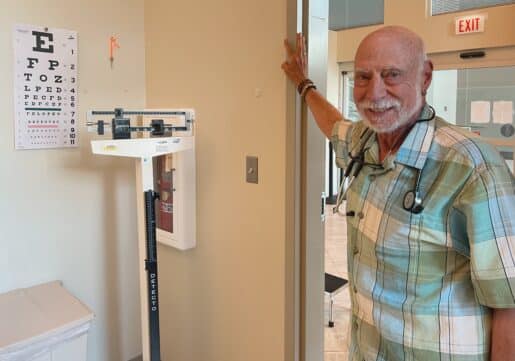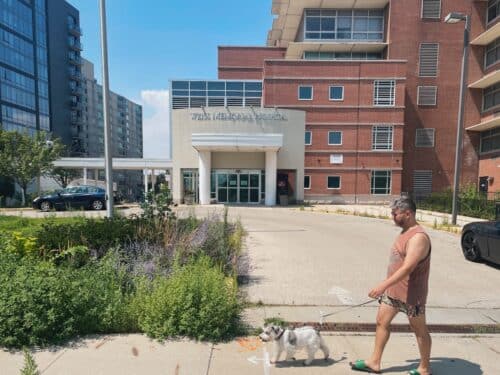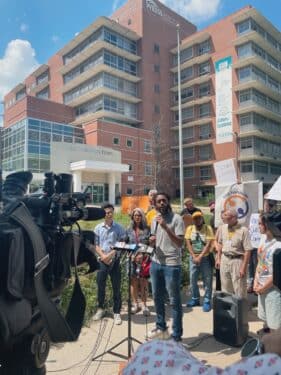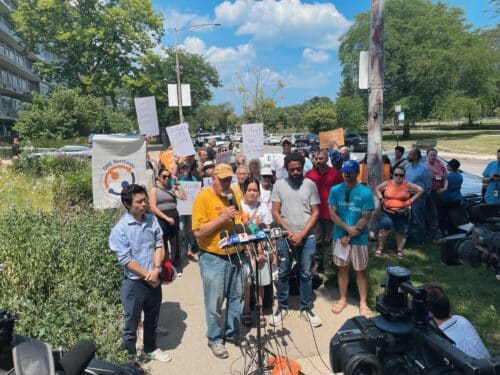Anger, confusion, and sadness take root in the early days of Weiss Memorial Hospital’s closure

Even before Weiss Memorial Hospital administrators locked the front doors on Friday, Aug. 8, the building looked abandoned. Over the months, weeds grew unchecked, blocking exterior signage, climbing the walls below the administration office windows, and lining the sidewalks.
“Can you believe this garbage?” one woman asked, waving toward the hospital’s entrance on Marine Drive. “These billionaires think they can buy anything, but they come in here and destroy our neighborhood.”
That morning, a Weiss employee stood outside shaking her head. “I remember we had a meeting where we were asked to bring in snowblowers,” she says, requesting anonymity for this story. “And then later to bring our gardening gear and do weeding.”
The outside neglect mirrors what employees say they witnessed inside over the past two years under owner Manoj K. Prasad, Resilience Healthcare CEO. Staff cite cuts to everything from marketing and landscaping to the Edgewater Community Clinic and patient mailings.
“You can’t do anything without his permission, but he doesn’t communicate to anyone,” the employee says. She recalled an administration-wide email in which Prasad chastised her for organizing an annual event without his approval.
“It has been cut, cut, cut. He cut so much that [we became] a shell of what we were,” says one director, also speaking anonymously to Chicago Health magazine.
On Aug. 8, the 236-bed facility shut down — locking its doors, closing the emergency department, and ending inpatient services.
The Illinois Department of Public Health (IDPH) made multiple visits starting in November 2024. IDPH reported findings to the Centers for Medicare & Medicaid Services, which revoked payments to Weiss on Aug. 9 for compliance issues in “nursing services, physical environment, and emergency services.”
Weiss received about 87% of its 2024 income from Medicare and Medicaid; in 2023, the combined inpatient and outpatient revenue was nearly $44 million from the two programs.
Prasad and financial partner Reddy Rathnakar Patlola paid $92 million in June 2022 to acquire Weiss and West Suburban Hospital in Oak Park from Pipeline Health, which had declared bankruptcy.
“I’m of the belief that there should be no hospital in our country getting shut down because of financial reasons,” Prasad told Oak Park’s Wednesday Journal in January 2023.
More questions than answers
Two days before Weiss closed, patients and clinicians gathered in the adjacent Medical Office Building to share concerns. Veronica Wade, who lives four blocks away, wondered what would happen to her medical records. Maria Burke had a pending surgery and hadn’t yet heard where or when it would be rescheduled.
“I’m in limbo like everybody else,” Burke says. “It’s very discouraging.”

Wade, 92, has relied on Weiss for more than 20 years — for care and social activities at the Senior Center, which once offered dance lessons, health classes, and fashion shows.
“How did this happen?” she asks. “Any emergency I have, I use the emergency room. My eye doctor, my cardiologist, my personal care doctor — they’re all located here. I’m familiar with the hospital, and at my age, that is very important.”
Another patient, Cheryl, who only gave her first name, continued to see her primary care physician at Weiss even after moving closer to Northwestern Memorial Hospital. “I feel just kind of lost,” she says. “I could go to Northwestern, but they’ve got such a long waiting list.”
The U.S. healthcare worker shortage fuels such delays. Experts cite a mix of reasons, including worker burnout, which the pandemic and health misinformation have exacerbated, as well as moral injury from working within a system that prioritizes profits, and an aging healthcare workforce. Only about 17% of active U.S. physicians are under age 40, and approximately 75 million Americans live in areas with a shortage of primary care providers.
Many Weiss physicians have practiced at the hospital for decades. The closure forces them to: retire, seek a position at a different hospital, or see outpatients in the connected Medical Office Building — which Weiss owns — and refer them elsewhere for procedures.
Sabah Khan, MD, who practiced internal medicine at Weiss for 36 years, says the hospital served an aging community with unparalleled access to care. “Almost the entire Uptown has an aging community, and we [have been] there for them, whatever shape.”
Uptown and Edgewater have more than 113,000 residents — nearly 16,000 over age 65, according to a Chicago Health analysis of Chicago Metropolitan Agency for Planning data.
Khan, part of the group meeting at Weiss, turned to the head of cardiac rehab. “I’m thinking of all your patients, how you’re assessing them, admitting them. What will happen to all those people?”
More than patients
Khan also works with the 64 residents in Weiss’ residency program. “I’m in a state of immense sadness. What a brain drain. We have a 100% board pass rate,” she says, referring to tests that residents take to become board-certified.
Many residents are on J-1 visas for training. “If they don’t have a job, they don’t have a visa,” Khan says.
The hospital is working with others to take four to five residents each, according to an anonymous director.

Murray Scheinman, MD, a 30-year Weiss internal medicine physician, says, “These kids committed here, got apartments, and are on track to get a residency. Now they have to scramble to find another hospital that will take them. It’s heartbreaking.”
The residency program staffed the hospital’s Arvey Clinic, which has accepted all patients, regardless of insurance, for more than 70 years. The website boasts that the residents speak 32 languages (including Urdu, Mongolian, and Serbo-Croatian), reflecting the area’s diversity.
“The Arvey Clinic has 2,200 patients on their roster. With no residents, who’s going to see those 2,200 people?” Scheinman asks. “Ask Prasad — no answer. No answer to anything.”
Khan, herself a Weiss patient, says, “This is so new to all of us. We’re being drowned.”
Seeing red
“I’m shaking because I’m so pissed off,” says Toni Segura, practice administrator for ophthalmologist Lawrence Stone, MD. Stone has had a private practice within Weiss for nearly four decades.
Segura’s frustration dates to mid-June, when Weiss evacuated patients due to air conditioning failure. The hospital transferred dozens of inpatients 16 miles to West Suburban Hospital as temperatures within the hospital neared 90 degrees.

“The a/c failed to go on, and this has been a problem for a number of years,” Scheinman says, alleging that Prasad knew of it when he purchased the hospitals. “You deal with it before it becomes a disaster. This guy just hoped for the best, and when the best didn’t happen, it started a cascade. I hope the Cubs win the World Series, but that’s not a plan. You hire a bunch of good players, and you build a team.”
Weiss administrators offered physicians office space in the newer Medical Office Building, which remains open for outpatient visits. Stone declined.
“Ophthalmology is not mobile,” Stone says. “You can’t move that equipment. It wouldn’t have been possible.”
Family Eye Physicians in Albany Park offered Stone space 3.5 miles away. About half of his patients transferred, but some now face longer trips.
“I had to say goodbye to a lot of my patients. I’m going to really miss them,” he says.
Segura manages the transition. “We’re dealing with people’s eyes, people who are visually impaired. I’m still home at midnight listening to all the voicemails,” he says. “We have a whole long list of surgeries and people calling us daily. We don’t know what to tell them. ”
On the day the hospital locked its doors, Segura was waiting in the Medical Office Building lobby to retrieve items from his former office. “I have 22 pairs of glasses up there right now that people have paid for, contact lenses….People are yelling at us,” he says.
Ongoing uncertainty
Another anonymous source, who led Weiss’ cardiac rehab program, says the uncertainty in the weeks leading up to the closure gave her stomachaches. The 25-year-old program is vital for patients recovering from heart issues.
“Most of my patients live in this area and want to come here because it’s close,” she says, adding that they also chose Weiss because other cardiac rehab programs have long waiting lists.
In June, administrators told her she could keep the program open because the unit’s air conditioning was functional. The next morning, the unit closed.
“It was so hard for me, calling people,” she says. “My hands are tied. I’m trying to call my patients every week to update them.”
The anonymous director says, “It’s bad management all around. A lot of people have been trying very hard this week to save the hospital.”
Weiss recently gained safety-net status, meaning it serves many vulnerable patients who are uninsured or on Medicaid and receives additional state funding. “Yes, there are a lot of hospitals, but each ward has 70,000 to 80,000 people,” the director says. “What happens when it becomes flu season?”
Nearby Thorek Memorial Hospital and Endeavor Swedish Covenant Hospital have already seen a 20% uptick in ER visits, Illinois State Sen. Mike Simmons and State Rep. Hoan Huynh report.
“Save Weiss”

As community members gathered for a press conference outside the hospital’s front entrance Friday afternoon, the Medical Office Building — where physicians still see outpatients — lost power. The building’s hum went unexpectedly silent, and security rushed to check elevators for trapped occupants.
A dozen people poured down the main stairway to see why the power had gone out. Some speculated Prasad hadn’t paid the electric bill.
“We’re all lost today,” one security guard told a nurse.
Unaware of the outage, Simmons addressed a crowd of about 50 people, who held signs reading “1 Hospital Down = Thousands Left Behind,” “Patients Over Profits,” and “Save Weiss.”
“Uptown is the landing ground for so many immigrants and refugees and asylum seekers from all around the world who would not have access to healthcare, would not have access to life-saving care if it were not for Weiss Hospital,” Simmons said at the press conference.
Simmons and Huynh have been meeting with Weiss management to try to save the hospital. Yet, Huynh said at the press conference, “We have seen mismanagement over and over and over again from the current CEO of this hospital. And we’ve seen over and over again the lack of care for our nurses, for our doctors, and for our patients, as the CEO strips away this hospital to its bare bones.”
Nationwide, an average of 21 hospitals closed annually between 2010 and 2015. In 2019, 47 closed. Closures strain access to care, hurt local economies, and eliminate jobs. “We’re the largest taxpayer in the area,” the Weiss director adds.
Huynh called Weiss “a community anchor for decades.” The hospital opened in 1952 to care for Jewish and immigrant populations other Chicago hospitals wouldn’t serve, as well as to give physicians facing discrimination a place to practice.

“When the hospital was conceived in the late ’40s, it was to fill a community need — to be a haven for doctors excluded elsewhere for religion and race,” says Louis A. Weiss, Chicago Health Magazine publisher and grandson of the hospital’s namesake.
Weiss adds, “Everybody believes that there aren’t enough doctors and nurses. What’s going to happen now is it will force some of these people into retirement.”
Khan and Scheinman haven’t left yet. “We’ve been waiting for years and years for Uptown to turn a corner. But it just never did, and this is the hospital that serves the community,” Scheinman says. “It’s gonna leave a big hole.”
Khan’s sadness hangs in the air. “We took care of our patients so well,” she says. “It’s not our fault.”
A statement on the hospital’s website reads, “Currently we are not providing emergency or inpatient services. The outpatient clinic services and testing continue to be provided as usual. Our Medical Records Department shall also remain open.”
Prasad, who told Oak Park’s Wednesday Journal in 2023, “I have no intentions of going anywhere. These two hospitals, they will flourish.” — has not responded to requests for comment.
On August 9, the day after Weiss locked its doors, the weeds outside stood tall.


An award-winning journalist, Katie has written for Chicago Health since 2016 and currently serves as Editor-in-Chief.











